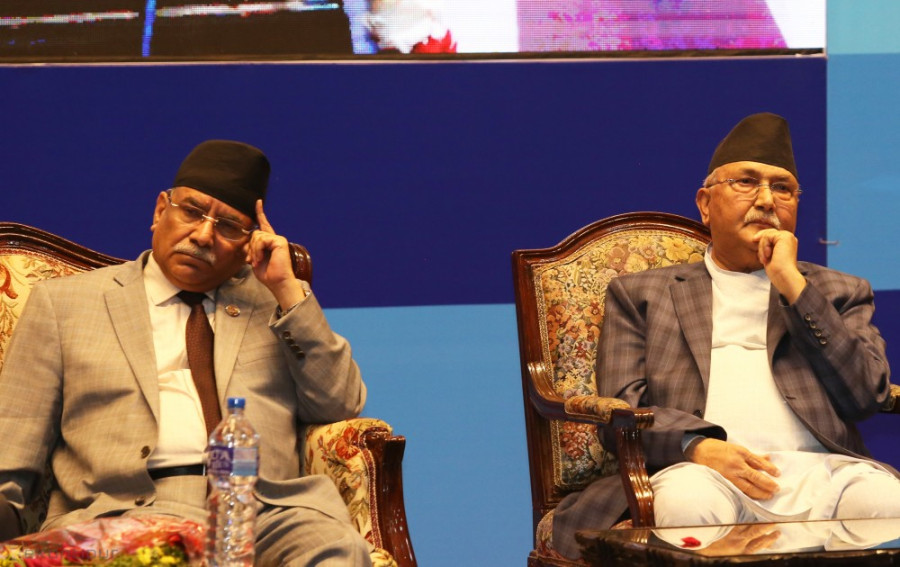Politics
Oli says people’s multiparty democracy is still relevant; Dahal calls for moving forward
The two leaders’ remarks come at a time when leaders in the ruling party are debating over its ideology.
Tika R Pradhan
Co-chairman of the ruling Nepal Communist Party, KP Sharma Oli, has said that "people's multiparty democracy" is still relevant, in what appeared to be his bid to quell concerns about the unified party's political line.
Appearing together with another co-chair Pushpa Kamal Dahal at a function organised to mark the 68th birth anniversary of the late leader Madan Bhandari, who propounded "people's multiparty democracy", at City Hall on Saturday, Oli said that's the line which complements current aspiration of socialism.
Oli's remarks come at a time when leaders within the ruling party are debating over party ideology, with former Maoists expressing reluctance to accept people's multiparty democracy and adopt a new and refined ideology in the changed context. The Maoists are also ready to drop their 21st century people's democracy for that.
Dahal, however, said that Bhandari’s quality was that he could accept changes according to the national and international context.
Bhandari had propounded people's multiparty democracy ensuring peaceful transformation of the communist party at a time when the communist movement was in downfall throughout the world.
Citing the quality of Bhandari, who could accept the changes, Dahal said the party should not only respect that quality but internalise it, in an indication that former UML and former Maoists should strive for a new and refined ideology.
Hinting at the nature of Oli, who is reluctant to accept changes, Dahal said the party should internalise the approach of Bhandari. “We should move forward incorporating all like-minded people leaving behind all kinds of prejudices and narrow thinking,” he said.
However, Oli said the unified party has named its political programme as ‘people’s democracy’ which incorporates the characteristics of people’s multiparty democracy.
After leaders of the Oli camp started floating the issue that the unified party cannot function in vacuum as people’s democracy was an abstract idea—the party has been debating over whether the party should adopt Bhandari’s people’s multi-party democracy or not. However, former Maoists and some former UML leaders have been saying that the party should develop an upgraded version of people’s multiparty democracy, 21st century people’s democracy as both of them were outdated and obsolete.
To show that they had no differences, Oli said the two chairs of the party have been moving ahead together knowing the complexities of the situation and the ways to tackle them.
Dahal, who led a decade-long violent conflict, also expressed concern over the failure to point out those responsible for the killing of high-profile leaders of the country. “We all know that Bhandari and Ashrit were killed but have not been able to point out the culprits—whether that was individual or power centre,” Dahal said. “Thus there is no guarantee that other leaders won’t be killed again.”
He said that such a fearful situation could lead the leaders to bow to the power centres for their safety. “We are not killed yet but could face the fate and have not ensured that such situation won’t happen again,” said Dahal, who has been under heavy security arrangements ever since he came overground. He also warned of a change in the political system if the NCP-led government is failed.
Meanwhile, saying that people have started mocking the party for delaying the unification process Oli claimed that the process would complete within the next 15 days and the development works would be expedited from the upcoming fiscal year.




 16.12°C Kathmandu
16.12°C Kathmandu















